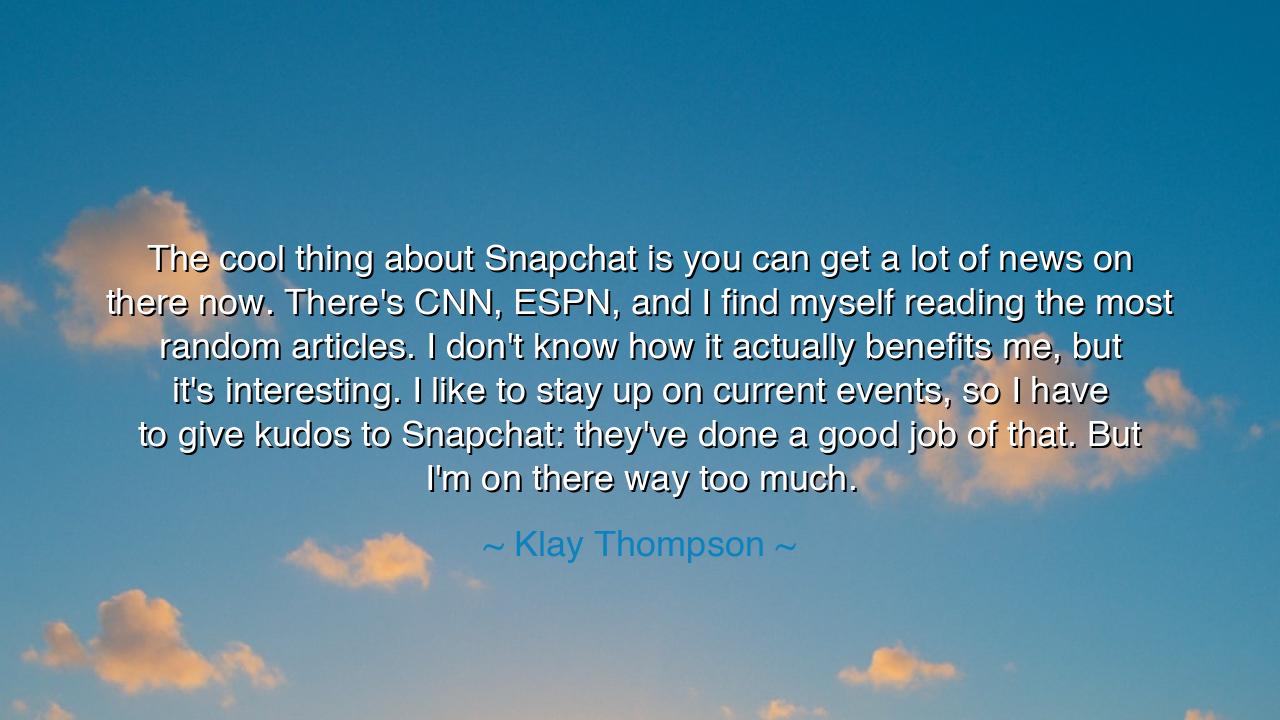
The cool thing about Snapchat is you can get a lot of news on
The cool thing about Snapchat is you can get a lot of news on there now. There's CNN, ESPN, and I find myself reading the most random articles. I don't know how it actually benefits me, but it's interesting. I like to stay up on current events, so I have to give kudos to Snapchat: they've done a good job of that. But I'm on there way too much.






The warrior of basketball and discipline, Klay Thompson, once spoke with unguarded honesty about the strange rhythm of modern life: “The cool thing about Snapchat is you can get a lot of news on there now. There's CNN, ESPN, and I find myself reading the most random articles. I don't know how it actually benefits me, but it's interesting. I like to stay up on current events, so I have to give kudos to Snapchat: they've done a good job of that. But I'm on there way too much.” At first glance, these words seem light — a passing observation from a man who conquers his battles on the court rather than the screen. Yet beneath their ease lies a profound reflection on the age of information: our struggle to stay connected to the world without being consumed by it.
In the manner of the ancients, let us search for the spirit within these words. When Klay speaks of Snapchat, he is not merely naming an app; he is naming the new temple of human attention. It is the fire that draws both warmth and danger — a place where curiosity feeds endlessly, but wisdom must struggle to survive. His confession, “I’m on there way too much,” is the modern echo of an ancient warning: that the same tools which serve us can also enslave us. The scroll of the timeline has replaced the scroll of parchment, yet the heart of humankind remains the same — restless, seeking knowledge, yet often lost in distraction.
The origin of this reflection lies in Klay Thompson’s nature — disciplined yet human, strong yet introspective. Known for his dedication to craft, for endless hours spent perfecting the shot that arcs like poetry through air, he understands the weight of focus. Yet even he, a man of routine and mastery, admits the pull of the modern current — the flood of images and stories that invite our attention at every moment. In his acknowledgment lies humility: he praises the spread of knowledge, even as he admits its cost. It is the eternal balance between curiosity and self-control, between wanting to know the world and remembering to live in it.
Consider, for a moment, the ancient scholars of Alexandria, who gathered scrolls from every corner of the known world in their quest for universal knowledge. Their library, the greatest of its time, was both a triumph and a temptation. For in seeking to know everything, they risked losing themselves in the labyrinth of words. When the library burned, it was said that the world wept — not only for the knowledge lost, but for the arrogance of man, who believed he could contain all wisdom in his hands. Now, centuries later, we hold libraries greater than Alexandria within our pockets, and the same question remains: what shall we do with so much knowing?
Klay’s words remind us that curiosity without direction can lead to emptiness. “I don’t know how it actually benefits me,” he says — a quiet confession that knowledge, without reflection, becomes noise. In an age when every voice can be heard, wisdom lies not in hearing them all, but in discerning which are worth listening to. To stay up on current events is noble; to stay lost in the scroll is surrender. The coolness he speaks of — the ability to access the world’s stories at a glance — must be tempered by the discipline to step away, to breathe, to remember one’s purpose.
O children of the digital fire, heed this teaching: master your tools, or they will master you. There is no sin in curiosity, only in forgetting yourself within it. Learn as Klay does — to admire innovation but question its hold on your time. The mind, like the body, must be trained; the will, like the muscle, must be strengthened through restraint. Choose wisely the streams of knowledge that feed your soul. Let your attention be deliberate, your scrolling mindful, your curiosity disciplined by purpose.
And so, the lesson stands as both modern and eternal: technology is not the enemy — distraction is. Let us, like Klay Thompson, give kudos to the gifts of the age, but never let them steal the sanctity of focus. Engage with the world, but do not drown in it. Seek knowledge, but balance it with stillness. For even as the world grows louder, the soul still whispers in silence. In that silence lies clarity — the calm of a warrior who, even amid the noise of the crowd, knows exactly where to place his next shot.






AAdministratorAdministrator
Welcome, honored guests. Please leave a comment, we will respond soon